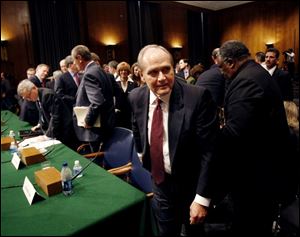
Auto bailout could be tied to government-run overhaul
12/5/2008
Chrysler Chief Executive Officer Robert Nardelli leaves the witness table on Capitol Hill in Washington on Thursday after testifying before a Senate Banking Committee hearing on the auto industry bailout.
WASHINGTON The government would order a major restructuring of Detroit s struggling Big Three auto companies in exchange for a multibillion-dollar bailout under a plan circulating in Congress.
Skeptical lawmakers are weighing whether to dole out as much as $34 billion in aid to the automakers as the once-mighty companies make their second round of pleas for government help to keep them from collapsing by year s end and potentially deepening an already painful recession.
With several lawmakers in both parties pressing them to consider a pre-negotiated bankruptcy something they have consistently shunned members of Congress and the Big Three both were contemplating a government-run restructuring that would yield similar results, including massive downsizing and labor givebacks.
U.S. auto executives were appearing before the House Financial Services Committee for the second time to outline their plans for staying afloat with a government infusion.
The rescue, though, was facing fresh obstacles in Congress, with lawmakers still unconvinced they should support yet another bailout and congressional officials saying a leading proposal for helping the carmakers wouldn t come close to covering the cost.
We re looking at a death sentence for the auto companies, Sen. Chris Dodd, D-Conn., the Senate Banking Committee chairman, said Thursday, pledging to try to help the Big Three. He quickly added, I m not a miracle worker and no one here is.
Finding the money was proving to be an uphill battle. Congressional budget analysts said one leading proposal to use an already approved fund set aside for making cars environmentally efficient would provide just $7.5 billion a fraction of what General Motors Corp., Ford Motor Co. and Chrysler LLC say they need.
Democratic congressional leaders are leaning on President George W. Bush to instead tap into the already enacted $700 billion Wall Street bailout fund to aid the auto industry, arguing that a carmaker collapse would have a devastating impact on the financial firms the program is designed to help.
The Bush administration has said it has no intention of doing so, arguing that the money was supposed to be for financial institutions, and instead wants to convert the fuel-efficiency money into emergency loans.
Auto state lawmakers are threatening to block the administration from accessing the second half of the financial rescue fund unless it comes to the aid of the Big Three.
And President-elect Barack Obama wasn t stepping forward with an alternative.
Rep. Barney Frank, D-Mass., who has been dealing with both the financial bailout and the auto rescue proposal as chairman of the House Financial Services Committee, said Obama is going to have to be more assertive than he s been.
Repentant after a botched first crack at bailout pleas, the companies executives said they were willing to overhaul their companies and own up to past errors.
We made mistakes, which we re learning from, GM chief Rick Wagoner said. Ford CEO Alan Mulally also acknowledged big missteps, saying his company s approach once was If you build it, they will come.
We produced more vehicles than our customers wanted, then slashed prices, he said. But as a result of these past mistakes, we are really focused, he said.
United Auto Workers union President Ron Gettelfinger, aligned with the industry in pressing for the aid, told senators that any kind of bankruptcy, even a prepackaged one, was not a viable option. Gettelfinger said consumers would not buy autos from bankrupt companies, no matter the terms of the arrangement.
He also warned that without action by Congress: I believe we could lose General Motors by the end of this month. He said the situation was dire.
It wasn t enough for some skeptics.
I don t know how they re going to make it, Sen. Richard C. Shelby, R-Ala., said of the automakers. If they called this a plan to get money, the bankers all over the world would laugh.
Even sympathetic Democrats said it was difficult to find a way to help the Big Three with time running out on this year s Congress.
Can it be done in the next week? said Sen. Evan Bayh, D-Ind. That s a tough lift.